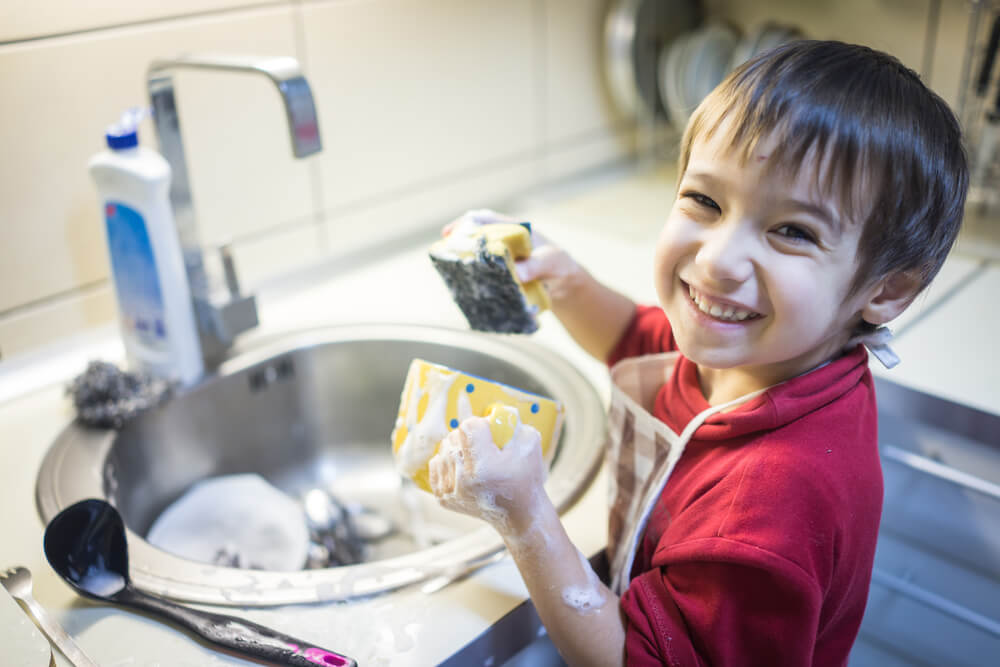
Creative Chores for Kids: How to Make Chores Fun
Chores… Even the word sounds tiring. Now, imagine telling small kids they need to do “some chores.” How can you make creative chores for kids?
Smart parents know that kids are also smart. As a result, they make creative chores for kids, so they will stay stimulated and motivated. You don’t even need grand tricks or bribes for this—you just need creative ideas.
In this article, we discussed why it’s important to engage your kids with chores. We also listed some creative ideas on how to make chores real fun. And not just forced fun.
Table of Contents
Why engage your kids with chores

As a parent, it can be tempting to do chores yourself rather than spend time begging your kids to do them—it’s easier that way, right? True, but that won’t be rewarding in the long run. Chores are not just mundane daily tasks. They can also be the earliest foundation for building your kid’s life skills, work ethic, and independence.
If you find yourself demotivated, this list of reasons below will surely motivate you again.
1. You will teach them the concept of “work ethic”.
Chores are the best way to teach kids about work ethic. For example, you can tell them that not cleaning their toys will untidy their play area. As a result, they would not be able to play more games or even invite their friends over. This will show them that not putting in the work in for the things you care about will result in consequences.
2. Through chores, they can learn other skills, too.
It’s just like writing—when you write, you will also know the value of research. Now, when you teach your kids chores like baking, they can also learn about the importance of measurements and accuracy. With cleaning, the importance of safety. With sorting and folding clothes, the significance of organizing and structure.
3. Chores help you teach important life skills.
This is the most cost-effective result of engaging your kids with chores. Want them to be more confident to take on challenges? Make chores a friendly competition. Want your kids to learn critical thinking? Incorporate puzzles and games into your chores. See the magic there?
4. Your kids can practice Cooperative Learning.
Cooperative Learning is a renowned teaching strategy. In this approach, children in small groups work towards the same goal by leaning on each other’s unique skills. To instill the invaluable lessons of Cooperative Learning, make your kids work in teams to finish chores. Teamwork is the dream work!
5. They can learn independence.
Your kids need to be confident, so they can be independent. Want them to stand on their own? Make them feel capable by giving accomplishments through chores. Achieving something is a rewarding feeling. When these small moments of accomplishments pile up, they will build into a confident child.
6. They can know the value of Delayed Gratification.
You will inevitably use rewards in your creative chores for kids, so this will be a good way to teach them Delayed Gratification. It is an invaluable skill because, in life, you won’t always be compensated for your efforts in a snap. Therefore, teach them this, so they can be mentally tough against rejections. They will focus on doing the right thing—instead of dwelling on their thirst for validation.
RELATED: Stuck at Home? 40 New Things You Can Learn to Keep Busy/Make Use of Time/Not Get Bored
8 creative chore ideas for kids

Now that you know the values of your kids doing chores, it’s time to put them in action. Remember what we said? You don’t need magic tricks. You just need creativity. Through these creative chores for kids, doing chores will never be a chore again.
1. Use storytelling.
Storytelling is a failproof way to engage kids and even exercise their creativity. For example, you can tell them that their play area is their kingdom. As princes or princesses, they have to keep their kingdoms tidy at all times, so the thieves or dragons won’t take their gold (their toys). This teaches them the concept of accountability, which can help them become more responsible in their later years.
2. Play their favorite tunes.
Music is another classic way to give more color to doing chores. For instance, with starting every task, you can play their favorite song until they finish it. After that, they can start another task with the next song. Doing chores with tunes is also a great way to bond with the whole family.
3. Break down the chores into mini tasks.
The idiom, “Don’t bite off more than you can chew” applies to the doing of chores as well. Why not break down the tasks into small to-dos? Don’t just tell your kids to clean their playroom. That’s vague. For example, you can tell them first that they need to return the books to the shelves. After that, they should put back the toys in the bins. Be more specific, so they won’t be overwhelmed.
4. Make Chore Charts.
Chore Charts are creative chores in which your kids can participate in. One good example is the Chore Wheel. Using a DIY colorful wheel, you can create a set of mini-tasks for, say, cleaning up after breakfast. You can write your kids’ names on a wheel and write the mini-tasks at its background. Your kids can take turns spinning the wheel every day, so they can do different mini-tasks every after breakfast!
5. Give weekly rewards.
Only give weekly rewards when they completed a set of tasks. You won’t give rewards because they made their beds, right? It’s not worth it. When you’re giving weekly rewards, you’re teaching them the value of Delayed Gratification. It does not always have to be money, too. You can treat them their favorite dessert or you can watch their favorite animated movie.
6. Create “job opportunities.”
Just like jobs, you can pay your kids after they do important chores. For example, you can create a Jar of Opportunities for each kid just like what Mary of Creating Mary’s Home did. You can write the prices of chores on popsicle sticks and compile them in their individual jars. Your kids can pick one stick every Saturday or Sunday. Next, when the chore is completed, you can pay them. This will teach them the value of work ethic and accountability.
7. Use a chore currency.
For every task completed, your kids can earn points. These points will then be converted to a “chore currency”, which they can use to buy prizes. It can be a new small toy, an hour of video games or YouTube, or a new book. This will teach them about the basics of work ethics and Delayed Gratification.
8. Hold an awards ceremony.
If you have the time and energy, you can even hold an annual awards ceremony. You can give honors and awards to your kids for doing a good job on their chores all year. For example, you can tell one kid she’s the best in keeping the toy bin clean at all times. You can also give an award for the best in washing dishes. You can get as creative as you like!
RELATED: Montessori Ideas: How To Keep Your Kids Occupied While You Work At Home
Final Thoughts
Part of growing up is taking responsibility. The best and easiest way to teach that to your younger kids is through chores. And if they nag and complain about doing chores? Just use our tips above. And if you get demotivated when they refuse to listen to you? Just go back to our first list and you will be motivated again. Good luck!
For more guides, check out our articles here.
As a parent, you know how it can be frustrating if your kids refuse to cooperate despite your extended efforts. Help new parents by telling your experiences and sharing with them creative ideas on how they can engage their kids with chores.
By registering on All Digital School, you can connect with other parents and teachers and discuss ideas on how to keep kids engaged at doing home chores. And if you’re a new parent, feel free to ask for help, advice, and suggestions from other parents. Get full access to our community boards. Signing up is fast and easy:
You can also create an account using Facebook or Google buttons below:
So go ahead and take part in our community. Ask questions, share experiences, and spill some of your home activity secrets!







Comments are closed.